I don’t know when the light turned on. But at some point I realized I needed to read more books. For most of my life, I thought books were dumb. In high school, I scored a 14 on the reading comprehension portion of my ACT. Yes, a 14. The ACT is stupid and overrated. There’s more. I failed A.P. English as a high school junior, doing what no human has ever done, successfully flunking an A.P. class.
You need to stop judging me.
Not only did I hate reading. I sucked at it.
As I type this some years later, consistently reading remains a struggle. I’ve heard of people reading for hours, “losing themselves” in a book. These people are weird. But I could just be jealous.
Reading, for me, is a matter of will, and I find the will most every day because nothing has contributed more to my growth.
Early in the game, I stayed close to home, mostly reading books about theology and Christian living. As my line between sacred and secular diminished, I began to engage different content.
This was huge for my faith. As I read books that challenged conventional biases, my perspective grew, as did my empathy. I noticed that most books hit on Christian themes (love, death, identity, joy, meaning living, etc.) even if the author doesn’t identifying them as such. Some of these books were intriguing. Some were “meh.” A few books, however, were transformative, shaping and inspiring my walk with God.
Look, I get it. You’re busy. And with the ridiculous number of books around, you hardly know where to start. I want to help you with that. Having read more than a few books, here are 7 “non-Christian” ones that inspired my faith (and will inspire yours).
1. Daring Greatly (Brene Brown)
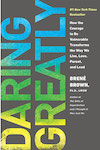 Why it’s inspiring: Few books more clearly and directly unpack vulnerability than this one. Brene Brown touches on stuff like scarcity and its proper response, which is not abundance (as you might think) but wholehearted living. Jesus, John 10, calls this the abundant life.
Why it’s inspiring: Few books more clearly and directly unpack vulnerability than this one. Brene Brown touches on stuff like scarcity and its proper response, which is not abundance (as you might think) but wholehearted living. Jesus, John 10, calls this the abundant life.
She also unpacks spiritual issues like worry and shame and how both negatively shape your identity. Again, topics Jesus addresses in his ministry. Put simply, this is an important book if you desire a full life.
And once you’re finished with this once, you will want to pick up The Gifts of Imperfection and Rising Strong, the first and third books in Brene Brown’s trinity on wholehearted living.
2. Man’s Search For Meaning (Victor Frankl)
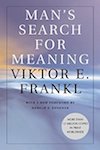 Why it’s inspiring: The setting for this book is a Nazi concentration camp. The author, Victor Frankl, horrifically details the conditions he faced as a prisoner in one of these camps. The question I continued to ask throughout was “Why not give up?” Why endure unthinkable suffering in the most hopeless of situations? The answers, I believe, are deeply spiritual, especially his thoughts on love and suffering.
Why it’s inspiring: The setting for this book is a Nazi concentration camp. The author, Victor Frankl, horrifically details the conditions he faced as a prisoner in one of these camps. The question I continued to ask throughout was “Why not give up?” Why endure unthinkable suffering in the most hopeless of situations? The answers, I believe, are deeply spiritual, especially his thoughts on love and suffering.
On love. “The salvation of man is through love and in love.” Nothing is more central to the Christian worldview than love. But reading it through the lens of a Holocaust survivor somehow makes you realize this anew.
On suffering. “If there is meaning in life at all, then there must be a meaning in suffering.” Suffering has meaning, otherwise it wouldn’t be so inextricably tied to life. The Christian worldview hinges around suffering. Even though Jesus’ death on the cross changes our story, we struggle to believe suffering has real value. And that’s especially tragic if, as Frankl suggests, suffering is tied to life.
3. When Breath Becomes Air (Paul Kalanithi)
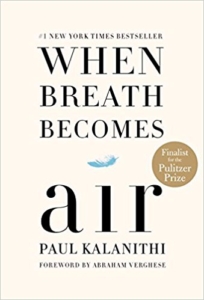 Why it’s inspiring: For starters, it’s a posthumous book, meaning the author is no longer alive. Paul Kalanithi was on the cusp of greatness, poised to become one of the best neurosurgeons around (and one of the best authors, as you will see if you read the book). Then cancer called. And when cancer calls, you must unfortunately answer. He battled it for a few years, dying at the age of 37.
Why it’s inspiring: For starters, it’s a posthumous book, meaning the author is no longer alive. Paul Kalanithi was on the cusp of greatness, poised to become one of the best neurosurgeons around (and one of the best authors, as you will see if you read the book). Then cancer called. And when cancer calls, you must unfortunately answer. He battled it for a few years, dying at the age of 37.
Paul Kalanithi approaches death with an odd courage, one Christians should possess naturally but rarely do. I don’t. The thought of death terrifies me. The author shows us how to live in the face of death. He also forces us to examine our lives and figure out what really matters. Too many of our pursuits are exposed as petty and vain in the presence of impending death.
4. The War of Art (Steven Pressfield)
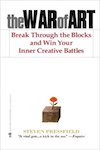 Why it’s inspiring: In a word…resistance. Resistance is an unseen, but very much real force. And though Steven Pressfield mentions this in spots, I’ll say it directly. Resistance is a spiritual problem. Now, most Christians know and believe such a force exists (whether you call the force evil or Satan or whatever), but at times we’re guilty of living as if it doesn’t.
Why it’s inspiring: In a word…resistance. Resistance is an unseen, but very much real force. And though Steven Pressfield mentions this in spots, I’ll say it directly. Resistance is a spiritual problem. Now, most Christians know and believe such a force exists (whether you call the force evil or Satan or whatever), but at times we’re guilty of living as if it doesn’t.
Every day you roll out of bed, resistance has one goal: by any means possible, prevent you from drawing closer to God and doing good in the world. If this book does nothing else, it at once reminds you that Satan exists and inspires you to press through this resistance.
5. The Alchemist (Paul Coelho)
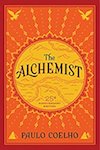 Why it’s inspiring: The only fiction book to make the list, The Alchemist is about the search for meaning and purpose. And where are such things found? Inside, of course. Few ideas are more central to the message of Jesus, that the abundant is not something that’s found but cultivated, from within.
Why it’s inspiring: The only fiction book to make the list, The Alchemist is about the search for meaning and purpose. And where are such things found? Inside, of course. Few ideas are more central to the message of Jesus, that the abundant is not something that’s found but cultivated, from within.
This is also a book that inspires you to enjoy the journey, specifically the present moment. There is no life to be found in “What ifs” and “If onlys.”
Finally, The Alchemist shows us both the reality and proper response to suffering and failure. By reality, I mean the journey to a meaningful life always includes failures. By response, I mean perspective. Failures aren’t setbacks. They’re proof your on the right path.
6. Grit (Angela Duckworth)
 Why it’s inspiring: If there’s an under-appreciated spiritual discipline, it’s this grit. The Bible would call it perseverance or steadfastness. When it comes to faith in God, grit or resilience is essential. You won’t “finish the race” (as the apostle Paul says) without it.
Why it’s inspiring: If there’s an under-appreciated spiritual discipline, it’s this grit. The Bible would call it perseverance or steadfastness. When it comes to faith in God, grit or resilience is essential. You won’t “finish the race” (as the apostle Paul says) without it.
Following Jesus isn’t a stroll down rainbow lane. It’s not void of fun and laughter, but many days it’s quite hard to walk the “straight and narrow.” At times you want to throw in the towel. Many do, especially in the face of suffering. But many don’t. The latter group (like Jesus or Paul or basically any character in the Bible) share the common virtue of grit (or perseverance). This book defines grit and shows you how to develop and nurture it.
I would love to hear from you. Have you read a “non-Christian” (I use air quotes because I don’t believe such a thing exists) book that inspired your faith? Leave a comment below.
Grace and peace, friends.


Sara Schroader
Thanks for this! I’ll check out some of them.
Frank Powell
Awesome!
TR Miller
I have read 3 of the 6 books listed. They were worthwhile and I intend to read the others. Christian novelists are another venue to explore – try Cyn Taylor’s Blue Mountain Sky.
Mary Hoff
Thank you for the review and referrals!
Roger Bodenstab
Going to check these out!
Sue DeLong
One of several books I love is by Wayne Dyer. — There’s a spiritual solution to every problem– excellent as are his other books
Also, My Grandfather’s Blessings by Rachael Remen
Excellent!!
Jkorb
The name of the book is “When Breath Becomes Air” not “Breathe.”
Shirley Toy
I like all of Chaim Potok’s novels – deals with Jewish life – faith and culture
Deb
I’d have to say To Kill A Mockingbird. It’s the best book and truly you can get lost in it. Truth is on trial and a young girl sees how the world sees truth at a young age.